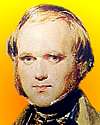
One letter stands out from the several thousand written by Charles Darwin in his lifetime. The letter, dated 5 Sep 1957, written from his home at Down, and sent to Asa Gray, contains his outline “on the means by which nature makes her species.” Darwin was aged 48 when he wrote this letter to the renowned botanist at Harvard University in the United States. With this letter, Darwin foreshadowed the publication of his great book, On the Origin of Species. The letter also fixed the date which established the priority of Charles Darwin for his great discovery. Of all of the letters written by Charles Darwin, the letter, dated 5 Sep 1957, is the most important one you should read.

On 5 Sep 1906, Ludwig Eduard Boltzmann died, the Austrian physicist who founded statistical mechanics. He held a firm belief in atomism (that all matter is made of atoms) and defended it against hostile opposition to this new idea. His struggle was a turning point in the history of the modern world. Today's book pick is: Boltzmanns Atom: The Great Debate That Launched A Revolution In Physics, by David Lindley who tells the story of this crucial scientific struggle over the existence of the atom during the second half of the 19th century. Boltzman had profound insights primarily into the physical nature of heat, gas and matter. Boltzman's brilliant insights brought about the golden age of physics that we continue to live in today. In 1850 no university taught such a subject as theoretical physics, but by 1900 it was a fully fledged discipline with whole institutes devoted to it. As the author shows, this burgeoning scientific movement led within just a few years to the discovery of quantum mechanics by Max Planck, radioactivity by Marie Curie, general relativity by Albert Einstein, the uncertainty principle by Werner Heisenberg, and more recently quantum electodynamics by Richard Feynman, the quark by Murray Gell-Mann, and even up-to-the minute developments in chaos and superstring theory. If you have read David Bodanis's E=mc², you will likely also enjoy this similar attempt to explain for laypeople the basis of modern physics.
It is available from Amazon, typically about New from $15.00. Used from $3.12. (As of earlier time of writing - subject to change.)
 | The most ordinary things are to philosophy a source of insoluble puzzles. In order to explain our perceptions it constructs the concept of matter and then finds matter quite useless either for itself having or for causing perceptions in a mind. With infinite ingenuity it constructs a concept of space or time and then finds it absolutely impossible that there be objects in this space or that processes occur during this time ... The source of this kind of logic lies in excessive confidence in the so-called laws of thought. |
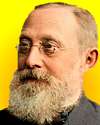 | Belief begins where science leaves off and ends where science begins. |
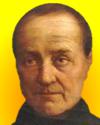 | Induction for deduction, with a view to construction. |
 | The body is a cell state in which every cell is a citizen. Disease is merely the conflict of the citizens of the state brought about by the action of external forces. (1858) |
| Before you look at today's web page, see if you can answer some of these questions about the events that happened on this day. Some of the names are very familiar. Others will likely stump you. Tickle your curiosity with these questions, then check your answers on today's web page. | |
| Births | |
 | Eugen Goldstein, born 5 Sep 1850, was a German physicist known for his work on electrical phenomena in gases and on cathode rays. He coined the term “cathode ray” (1876) emitted from a cathode. What other rays did he discover? |
 | On 5 Sep 1667, Girolamo Saccheri was born, an Italian mathematician who worked to prove a long-standing yet formerly unproven postulate, which can be stated as, “Through any point not on a given line, one and only one line can be drawn that is parallel to the given line.” Who originated (but didn't prove) the postulate? |
| Deaths | |
 | Ludwig Eduard Boltzmann (1844-1906) was a physicist who founded statistical mechanics. He also worked out a kinetic theory of gases, and the Stefan-Boltzmann law concerning a relationship between the temperature of a body and the radiation it emits. What was the cause of his death? |
 | On 5 Sep 1902, Rudolf Virchow died, a German pathologist and statesman who originated the concept that disease arises in the individual cells of a tissue and, with publication of his Cellular Pathology (1858), founded the science of cellular pathology. Virchow also worked on improving sanitary conditions in Berlin. He also helped develop yet another (unrelated) field of science in which he encouraged his friend Heinrich Schliemann. In what science did Virchow spend some time participating with Schliemann? |
| Events | |
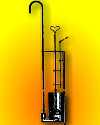 | On 5 Sep of a certain year, the first gasoline pump in the U.S. was sold to Jake Gumper, owner of a service station in Fort Wayne, Indiana, as invented and built by Sylvanus Bowser. What was the decade of this event? |
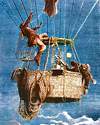 | On 5 Sep 1862, metereologist James Glaisher and his pilot Henry Tracey Coxwell made a balloon ascent to a record height. Its precise altitude is unknown because Glaisher lost consciousness and was unable to read the barometer. Death was narrowly avoided by the courageous efforts of the pilot. The height was estimated by extrapolating measurements already recorded on the ascent. To what estimated height in the atmosphere did these men rise in 1862? |
Fast answers for the previous newsletter for September 4: a type of virus that infects bacteria, rather than ordinary cells • submarine • ice • 1,600,000 to 10,000 years ago • Harry Truman • decade of 1882.
 If you enjoy this newsletter, the website, or wish to offer encouragement or ideas, please send feedback by using your mail reader Reply button.
If you enjoy this newsletter, the website, or wish to offer encouragement or ideas, please send feedback by using your mail reader Reply button. Your click on a Facebook, StumbleUpon, or other social button on the site webpages is also a welcome sign of appreciation. Thank you for using them.
© This newsletter is copyright 2020 by todayinsci.com. Please respect the Webmaster's wishes and do not put copies online of the Newsletter — or any Today in Science History webpage. (If you already have done so, please remove them. Thank you.) Offline use in education is encouraged such as a printout on a bulletin board, or projected for classroom viewing. Online, descriptive links to our pages are welcomed, as these will provide a reader with the most recent revisions, additions and/or corrections of a webpage. For any other copyright questions, please contact the Webmaster by using your mail reader Reply button.
--
If you do not want to receive any more newsletters, Unsubscribe
To update your preferences and to unsubscribe visit this link
Executive Real Estate Business Class
-
"It was like a man with wings. It wasn't like anything you'd see on TV or in a monster movie." ...
About the publisher
Search This Blog
Blog Archive
-
▼
2020
(1542)
-
▼
September
(173)
- SCIENCE: Just how big is Everest?
- The Latest News from History News Network
- On This Day for September 30 - Munich Agreement si...
- We are called to return to our foundational values...
- Newsletter for Wednesday 30 September.
- They Killed His Wife And Left Him For Dead – Then ...
- TRAVEL: Telling new truths about America’s histori...
- Make learning fun with Nat Geo Kids magazine! Subs...
- On This Day for September 29 - British mandate in ...
- Newsletter for Tuesday 29 September.
- Special Edition: Dinosaurs come to life like never...
- September 29: On This Day in History
- HISTORY: America's most endangered historic sites
- New This Week on History News Network
- On This Day for September 28 - California “discove...
- Newsletter for Monday 28 September.
- September 28: On This Day in History
- FAMILY: What do I tell my kids about wildfires and...
- On This Day for September 27 - Norman Conquest beg...
- Newsletter for Sunday 27 September.
- September 27: The Rosetta Stone, E=mc² and Fear as...
- The Compass: Indonesia
- On This Day for September 26 - First televised U.S...
- Newsletter for Saturday 26 September.
- September 26: Frances Drake's Circumnavigation, th...
- CORONAVIRUS UPDATE: Is this the end of the office?
- PHOTOGRAPHY: They feed us. Now we see them.
- The assassination of Lord Mountbatten | Enola Holm...
- 39,500-Year-Old Cave Bear Discovered Perfectly Pre...
- On This Day for September 25 - Pacific Ocean sight...
- The Roundup Top Ten for September 25, 2020
- Newsletter for Friday 25 September.
- September 25: Battle of Stamford Bridge, Remote Co...
- ANIMALS: These mighty elephants find peace
- On This Day for September 24 - Federal troops sent...
- Newsletter for Thursday 24 September.
- Global cartels taking control of the world + HPA B...
- September 24: Decline of the Byzantine Empire, Ope...
- YOUR WEEKLY ESCAPE: America's oldest mystery
- SCIENCE: How to cope with a big death toll
- The Latest News from History News Network
- On This Day for September 23 - Neptune observed, J...
- Newsletter for Wednesday 23 September.
- September 23: Nintendo, the Start of Data Processi...
- TRAVEL: How will America’s state parks survive?
- Matching gift opportunity for Sumatran rhinos
- On This Day for September 22 - Solidarity formed, ...
- Newsletter for Tuesday 22 September.
- September 22: Salem Witch Trials, Iraq's Invasion ...
- HISTORY: Who can replace RBG?
- Feed their curiosity! Get Nat Geo Kids magazine fo...
- New This Week on History News Network
- On This Day for September 21 - Joseph Smith's visi...
- Newsletter for Monday 21 September.
- September 21: France, China and a Sheep Shearing R...
- FAMILY: Don’t tell your kids outdated stuff about ...
- On This Day for September 20 - Rome incorporated i...
- Pro-life is not Politics + Vickie Travis's message...
- Newsletter for Sunday 20 September.
- September 20: Attila the Hun, Magellan's Circumnav...
- The Compass: Chile
- Matching gift opportunity for Sumatran rhinos
- On This Day for September 19 - George Washington's...
- Newsletter for Saturday 19 September.
- CORONAVIRUS UPDATE: Young people are spreading the...
- September 19: 1st Country to Grant Women the Right...
- PHOTOGRAPHY: How to make dinos look new (CORRECTED)
- Quick Note: How to Save Videos by Downloading
- PHOTOGRAPHY: How to make dinos look new
- The Mayflower | Medieval spiders | Ancient Egypt f...
- When She Found Out Her Boyfriend Was A Serial Kill...
- The Roundup Top Ten from History News Network
- On This Day for September 18 - Mukden seized by Ja...
- Newsletter for Friday 18 September.
- "Truth Crushes Evil" + We're Winding down + What ...
- YOUR WEEKLY ESCAPE: The country that doesn't exist
- September 18: Great Fire of Moscow, the CIA and El...
- ANIMALS: How U.S. officials stopped the flying squ...
- Two New Podcasts From HISTORY
- Don't miss out: back to school savings for learner...
- On This Day for September 17 - Camp David Accords ...
- Newsletter for Thursday 17 September.
- September 17: Bloodiest Day in the American Civil ...
- SCIENCE: He found part of a one-of-a-kind dinosaur
- SPECIAL REPORT: How the West is primed to burn
- The Latest News from History News Network
- On This Day for September 16 - Mayflower's departu...
- Newsletter for Wednesday 16 September.
- September 16: French Abolish Slavery, Malaysia For...
- TRAVEL: Will slowing down help you get stronger?
- Special Report: How do we end this pandemic?
- On This Day for September 15 - Central Americans g...
- Newsletter for Tuesday 15 September.
- September 15: Darwin Reaches the Galapagos, Penici...
- HISTORY: How the U.S. battled catastrophic wildfir...
- BREAKING NEWS: Possible evidence of life found on ...
- Discover Remarkable Leaders With Nat Geo History M...
- On This Day for September 14 - Mexico City capture...
- New This Week on History News Network
- Newsletter for Monday 14 September.
-
▼
September
(173)
-
Blogroll
-
About
HistoryFact










0 comments:
Post a Comment